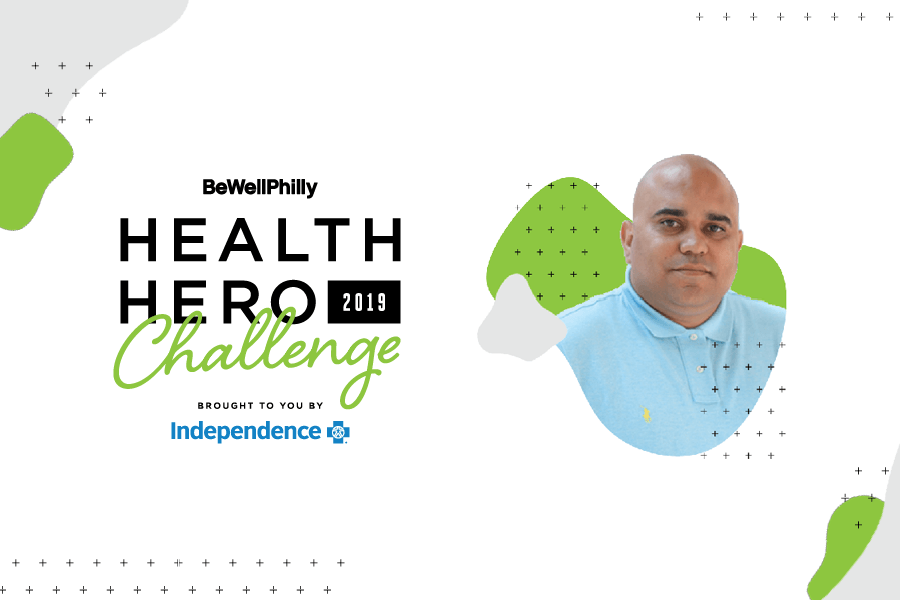After Going to Jail on a Narcotics Charge, This Addiction Recovery Advocate Believes Everyone Deserves Support
Evan Figueroa-Vargas now sits on the board of Pathways to Housing PA, a nonprofit that provides housing, no matter the circumstances.

After dealing with a substance use disorder and being incarcerated as a result, Evan Figueroa-Vargas advocates for those in addiction recovery and those with other mental health challenges as a board member at Pathways to Housing PA. / Graphic by Meredith Getzfread
Over the next few weeks, we’ll be chatting with our semifinalists in the 2019 Be Well Philly Health Hero Challenge to give you a glimpse of the people who are helping Philadelphians live healthier lives. Vote once a day, every day, to help decide which of these 10 semifinalists become one of three finalists — and get a sizable donation to a charity of their choice — here.
Name: Evan Figueroa-Vargas
Role: Program manager in the homeless specialty for PeerNet Homeless Specialty and a board member of Pathways to Housing PA, a nonprofit that supports those experiencing mental health challenges and chronic homelessness by providing housing first and then combining that housing with supportive treatment services in the areas of mental and physical health, substance abuse, education, and employment.
***
Describe a health- or fitness-related turning point in your life.
In 2011, I began my recovery journey from mental health and substance use challenges.
I am a person who has been diagnosed with generalized anxiety disorder in addition to depression at one point in time. I associate most of my depression and anxiety with my substance abuse disorder. Primarily, I was abusing prescription pain medication in addition to benzodiazepines, like Xanax and Klonopin and things of that nature. When you’re withdrawn or you don’t have that in your system, it causes a lot of anxiety and depression.
Treatment for me meant incarceration. My quote unquote treatment started when I was incarcerated on September 8th, 2011, for five to six months. I’d been arrested for retail theft (I was stealing out of food markets to be able to feed myself) and possession of narcotics. The judge decided that I qualified for an inpatient treatment program that was 21 days, and then I transferred to an outpatient program in Philadelphia. Entering into recovery was the biggest turning point of my life, and, in turn a big turning point for my family and my community.
What motivates you to try to make Philadelphia a healthier place?
What motivates me is seeing suffering in my community and knowing that there are solutions out there. I want to bring those solutions to my community so that others can experience the gifts of wellness. I am motivated to inspire other Philadelphians to achieve a healthy life that not only includes physical health but also mental and emotional health.
Sometimes we walk past people and say, ‘Hey, how it’s going?’ But are we really prepared to hear what people have to say? Especially when you talk about the Latino community, machismo rules. You say nothing, you feel nothing. It’s all, ‘Man up, suck it up,’ this and that. I think that’s almost more harmful than the trauma we experience — having to bottle up all the things that we experience on a daily basis. When we create environments where we welcome people to talk about mental health, it helps us move forward as a society.
What “policy” would you institute to make greater Philadelphia a healthier region?
The policy that I would institute is to abolish punishing people for symptoms of their illness. I would ensure that we never incarcerate people, or re-carcerate people, for exhibiting symptoms of a substance use disorder. Substance use disorder is an illness, not a moral failure. If someone recovering from substance use disorder experiences a slip, we need to continue to provide that individual with support the same way we would continue to treat a person who is experiencing lung cancer and returns to active cigarette smoking.
What’s the most important part of your health and wellness regimen?
For me, it’s dealing with my long-term substance abuse disorder and taking care of my mental health conditions, whether that’s through meditation, giving back to the community, taking medication as prescribed. All those things are very important to me because if I’m not well, I can’t help others.
What is your number one piece of health-related advice/encouragement?
Be open, vulnerable, and authentic. Share your experiences with your peers. You will be surprised to learn that we are all in recovery from something, whether it is a substance use disorder, trauma, an illness, etc. We need to support one another in our road to recovery, and one way to do that is simply just to talk about our experiences.
Why is your selected charity meaningful to you?
As a Board Member for Pathways to Housing, Pa (PTHPA), I believe that everyone should have low-barrier access to decent, safe, affordable housing without precondition since this is a fundamental human right. PTHPA meets people experiencing homelessness where they are at in their struggles with homelessness, substance use disorder, and mental health conditions, housing people first in a community of their choice and providing support around existing challenges to help people live a life of fulfillment and wellness.
They provide what is known as the peer support model, where they have individuals who are certified peer specialists who have experience in trauma, mental health conditions, substance abuse, homelessness, go out into the community and meet with individuals. They say, ‘I know because I’ve been there. Let me show you some of the ways I’ve overcome those obstacles, and hopefully we can help you overcome some of the obstacles that you’re facing.’


